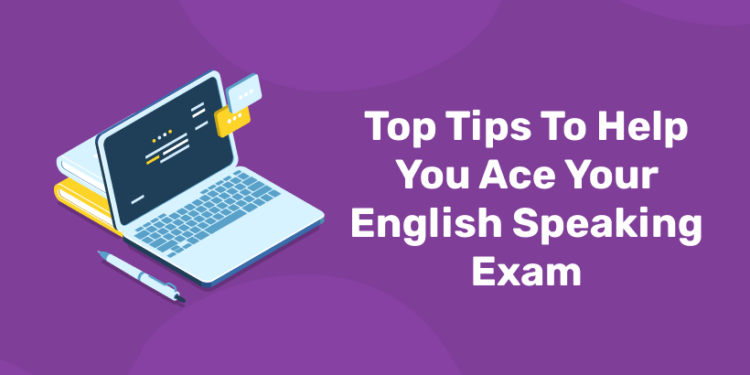There’s a wide range of English exams available for you to check your level or prove your abilities as we have seen before. Although all exams are slightly different and you need to know some tips to crack the exam effortlessly. These speaking tips mentioned in this article will help you to score highly in the speaking portion of any exam.
Tips To Help You Ace Your English Speaking in Exams
The day of your English exam is sneaking closer and closer. In nearly all cases, you’ll be evaluated on four different skills, not to mention your grammar and vocabulary knowledge, therefore have you any idea where you even start?
Whether you’re studying for TOEFL, IELTS, or another English language exam, prepare like a winner with these friendly study tips. It will help you to ace your English speaking exams.
Understand the exam content and format
Most English exams have details about how the test is structured on their websites. Make sure you read this carefully or ask your tutor to explain it. Knowing what to predict in the test choice make you feel more confident, and understanding what you ought to do in each section will help you make sure you meet the necessities to pass.
Make sure you answer the questions
Examiners are trained well to spot people who have memorized answers before the exam. One of the ways they spot this is when people give an answer that is connected to a question but doesn’t answer it.
Make sure you listen to the questions or read them more carefully and answer all the points required. It’s fine to add more details afterward but make it your priority to cover all the details you ought to give to fully answer the question first.
Sign Up for ENTRI Learning App for Learning the Grammar Rules!
Prepare well but don’t memorize answers
Make sure you can cover all the necessary details that you know you will require for the exam. Think about how to talk about your past, your plans for the future, things you like (and don’t like), your daily life, and the place you live in. These are all common subjects asked about in the opening questions of speaking exams. Don’t just memorize answers for questions, though. The examiner will be able to tell and, in some exams, you will fail to get more marks for this.
Focus on your weaknesses
Before studying for your English exam, it is important to ask yourself: what areas am I weakest in? Most of the time, all four language skills are weighted equally in an English language exam, so you shouldn’t pay much time in areas where you’re already powerful. Put more of your time into enhancing your weaknesses.
If you’ve taken an equivalent exam in the past, look through it carefully and make notes on where you went wrong. Or, you can check your existing skill level by taking a practice test right away. Either way, you will notice where you perform the worst out in listening, reading, writing, and speaking.
Prepare faster with a tutor
You can see many instructors who specialize in English language exams. These instructors know exactly what it takes to pass the English language exams from the experience of coaching students like you to succeed! They’ll be able to help you put your plan jointly, supply resources, and concentrate on where you ought to enhance, and will improve your speaking skills with 1-on-1 lessons (if that’s what you need). You can read the reviews and testimonials of each instructor to see if they fit your requirements, and how they’ve helped learners just like you.
Whether you require a quick growth of knowledge before your exam, or if your exam is months away, you can grow in confidence with professional online tutors on Preply. There are tutors for as in our ENTRI Learning platform and are available anytime you need them.
Write a daily journal in English
Writing a daily journal is not just amazing for your mind and it’s also a great way to boost your ability to form sentences.
Writing a journal is a wonderful exercise to help you think in your target language and form sentences fast. You’ll also spot which essential, daily-use words are missing from your vocabulary. This implies you can then look them up and add them to your flashcard app to memorize later.
You should also accept in mind that both the IELTS and TOEFL exams have a section where you will be asked to write about your opinion or explain something. This is where your journal will come in handy, as you’ll write about things, people, or events in your own life, as well as your view on them.
A journal is also a great mechanism to stay motivated. Imagine looking back through a month of journal entries and witnessing the progress you’ve completed! The topics you write about in your journal will also provide you with great ideas for what to discuss when you practice your speaking skills.
Practice speaking regularly
You won’t see a greater language fluency “hack” than a good conversation. There’s something about real-life conversation that supports your language skills level up fast: you ought to create sentences spontaneously which pushes you to think about the right vocabulary, and you also accept listening practice and real-time feedback.
One study by a University found that the language skills of learners who practice speaking exceed those who learn from comprehension activities only. This is likely because our memories prioritize human-to-human occasions with emotions tied to them. Although flashcards and other study methods are useful, in a live conversation, you get to execute all of the words and phrases you’ve practiced over time.
Lacking someone with whom you can rehearse speaking regularly? Sharpen your English skills with a tutor, who can give you expert English exam advice, plus speaking practice, for as little as per hour through our course “English Padikkyam with Inverted Coconut” in ENTRI Learning App by Aparna Mulberry.
Read as much as you can
Always get into reading English material as much as possible. Reading lets you take in the language at your own pace, and it’s also a fun and fascinating way to grow your knowledge. Not just in the case of learning the English language, but in other subjects too!
A little bit of reading every day or two supports a lot. You could read academic journals, books, or newspapers (materials that the IELTS Academic test is based on) or texts you often overlook in daily life: magazines, newspapers, novels, or advertisements on which the IELTS General Training test is based. Your reading material could be fact, fiction, or anything in between and that’s your choice. You could also dip into some classic stories in English, where we have a whole list based on your current English level.
While you read, don’t be afraid to make a mess of your books and texts. Scribble down notes, definitions, and translations. This will help you identify familiar words and how they are used in real sentences and expressions.
Don’t forget to listen
Listening is not as active as speaking, reading, or writing, so it’s likely not as hard or necessary… right? Thinking this way is a huge mistake, as research shows that when we speak, we spend about40-50% of the time listening. Reach that to the 25-30% speaking, and you’ve got a skill that ought to be developed for your English exam.
You can train your listening skills in two ways: active listening or passive listening. Active listening implies giving your full, committed attention to a podcast, YouTube video, or movie and writing notes as you listen. You can practice active listening while in talk with an English tutor or language exchange partner, and take notes whenever you learn a new word or spot any voids in your vocabulary.
Passive listening is where you listen to a podcast or YouTube video while doing other activities, like cleaning your room or walking the streets. It still counts as listening practice, but it’s less concentrated and can be done in your “resting” times.
For More Practical Ways to Practice Your Listening, Sign Up for ENTRI Learning App!
Once you’ve completed all the listening skills you require with these study habits, you will require to put everything you’ve learned into practice with the test material.
Take a practice test
In our first tip mentioned earlier, we recommended familiarising yourself with the exam material and understanding the kind of answers that examiners want to see. But it’s not enough to just “know” what will get you the most elevated score. You ought to put this into practice yourself.
Fortunately, learning aids and official practice papers can be found for any of the tests online. Once you have downloaded the official TOEFL, IELTS, or other appropriate practice tests, sit somewhere without distractions, set a timer on your phone, and get to work on putting everything you’ve learned into training. When you’ve completed, compare your work with best practice resources and answers from past exams.
One tip is to try and emulate the exact experience of the exam date. If you like to take it a step further, you can drink a cup of coffee before you take a practice test. The adrenaline from the caffeine will deliver a similar feeling to the nerves you will have on the day. By affecting the exact experience, you will feel calmer and prepared when exam day comes.
Cracking any exams is difficult in some ways. It is the same in the case of English-speaking exams. Through this article, we will have tried to discuss the most effective tips to help you ace your English-speaking exams. For more details and practice you can access our ENTRI Learning App and you can join the best spoken English course provided.













